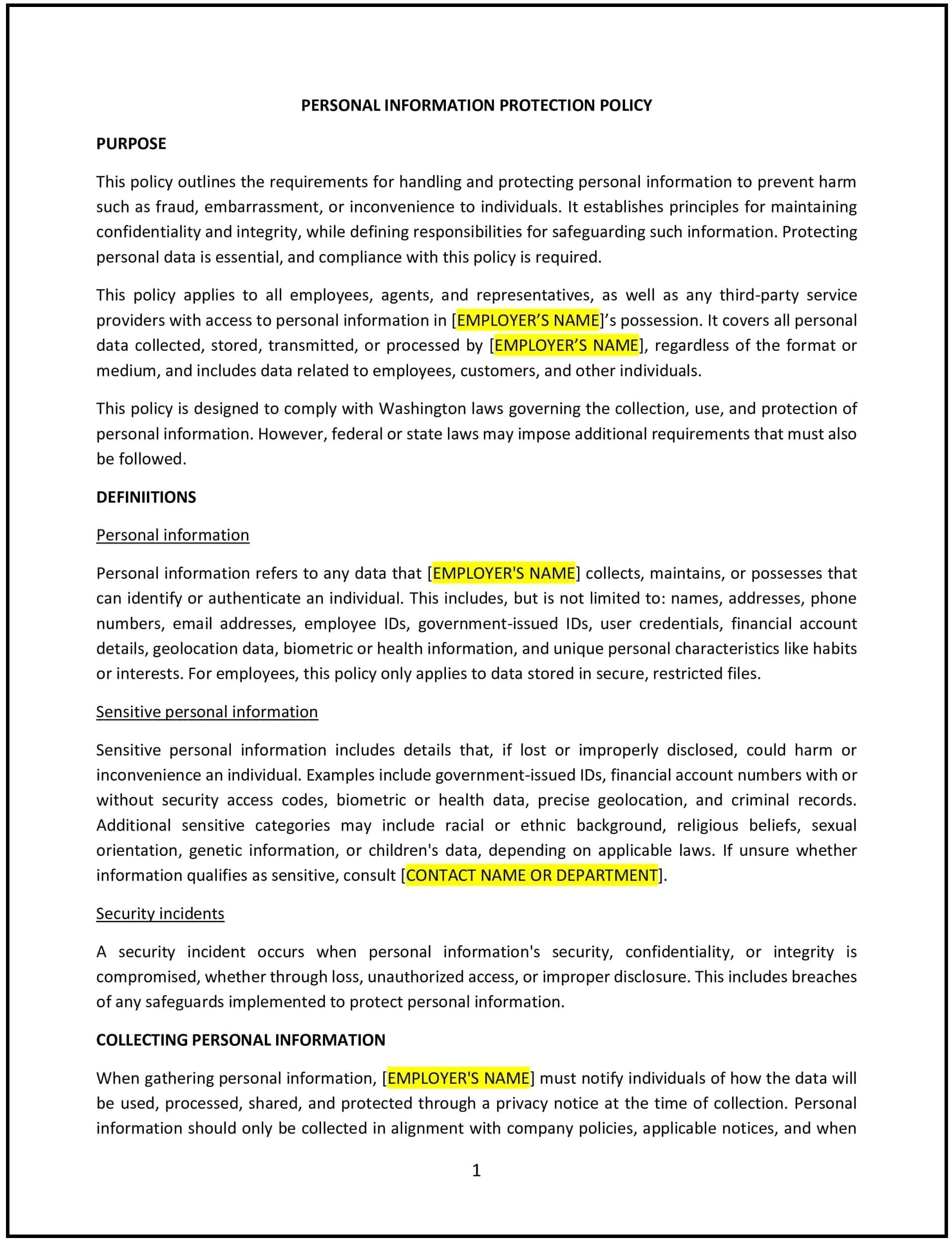Personal information protection policy (Washington): Free template
Got contracts to review? While you're here for policies, let Cobrief make contract review effortless—start your free review now.

Customize this template for free
This personal information protection policy is designed to help Washington businesses safeguard the personal information of employees, clients, and other stakeholders. The policy outlines how personal data should be collected, used, stored, and protected in compliance with Washington state laws and federal regulations. It ensures that the business takes appropriate measures to prevent unauthorized access, loss, or misuse of personal information.
By adopting this policy, businesses can build trust with their stakeholders, enhance security, and promote compliance with data protection laws.
How to use this personal information protection policy (Washington)
- Define personal information: The policy should provide a clear definition of "personal information," including both sensitive and non-sensitive data such as names, contact details, social security numbers, and financial information. It should clarify what types of personal data are collected and processed by the business.
- Specify data collection and processing methods: The policy should outline how personal information is collected, stored, and processed. This includes the methods for collecting data (e.g., forms, applications, electronic records), how data is processed (e.g., for payroll or marketing purposes), and who has access to it.
- Address data security measures: The policy should specify the security measures the company has in place to protect personal information, such as encryption, secure access controls, and regular audits. It should also explain how the company prevents unauthorized access or breaches of personal data.
- Set guidelines for sharing personal information: The policy should provide clear guidelines on when personal information can be shared with third parties, such as contractors, vendors, or regulatory bodies. It should specify the conditions under which data sharing is permitted, including obtaining consent when necessary.
- Comply with Washington and federal laws: The policy should ensure compliance with Washington state laws regarding personal data protection, including any specific state regulations related to the handling of personal information. It should also comply with federal laws, such as the Privacy Act, and ensure that the company meets any applicable data protection standards.
- Define retention and disposal procedures: The policy should specify how long personal information will be retained and the procedures for securely disposing of personal data when it is no longer needed. This ensures that personal information is not kept longer than necessary and is safely disposed of when it is no longer required.
- Ensure training and awareness: The policy should require that employees who handle personal information receive training on how to protect data and comply with the company’s data protection practices. It should also outline the procedures for reporting data breaches or suspected violations of the policy.
- Review and update regularly: Periodically review and update the policy to ensure it remains compliant with Washington state laws, federal regulations, and any changes in the company’s data handling practices. Regular updates will help ensure the policy stays relevant and effective.
Benefits of using this personal information protection policy (Washington)
This policy offers several benefits for Washington businesses:
- Builds trust with stakeholders: By protecting personal information, businesses can build trust with employees, customers, and partners, demonstrating a commitment to privacy and security.
- Reduces legal risks: The policy helps businesses comply with Washington state and federal laws regarding data protection, reducing the risk of legal issues, penalties, or reputational damage due to data breaches or mishandling of personal information.
- Enhances security: The policy establishes clear guidelines for securing personal information, reducing the likelihood of unauthorized access, loss, or misuse of data.
- Promotes transparency: The policy ensures that the company is transparent about how personal information is collected, used, and shared, which helps maintain transparency with stakeholders.
- Protects business interests: By setting clear guidelines for data protection, the policy helps safeguard the company’s intellectual property and sensitive business information, reducing the risk of data breaches that could harm the business.
- Increases employee awareness: The policy helps employees understand the importance of protecting personal information and the role they play in maintaining security, contributing to a culture of privacy within the organization.
Tips for using this personal information protection policy (Washington)
- Communicate the policy clearly: Ensure all employees are aware of the personal information protection policy and understand how it applies to their daily activities. Include the policy in the employee handbook, review it during onboarding, and provide periodic reminders.
- Implement strong security practices: Ensure that employees follow best practices for securing personal information, such as using strong passwords, encrypting sensitive data, and following secure data-sharing protocols.
- Monitor and audit data access: Regularly monitor and audit who has access to personal information and ensure that only authorized personnel have access to sensitive data. This will help prevent unauthorized access or data breaches.
- Provide ongoing training: Employees who handle personal information should receive regular training on data protection best practices, including how to handle sensitive data securely and how to respond to potential data breaches.
- Review data retention and disposal practices: Regularly review how long personal information is kept and ensure it is securely disposed of when it is no longer necessary. This helps ensure compliance with data protection laws and minimizes the risk of retaining unnecessary data.
- Review and update regularly: Periodically review the policy to ensure it remains compliant with Washington state laws, federal regulations, and any changes in the company’s operations. Regular updates will help keep the policy relevant and effective.